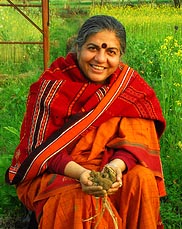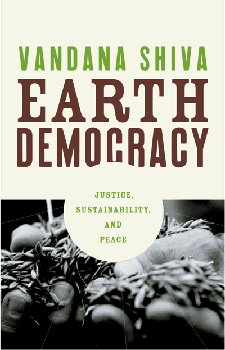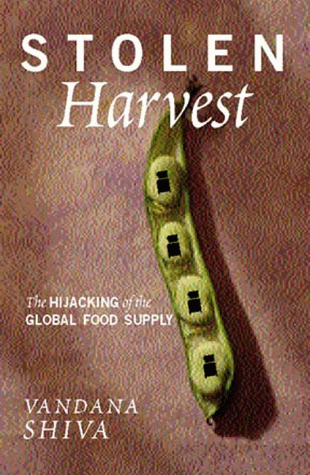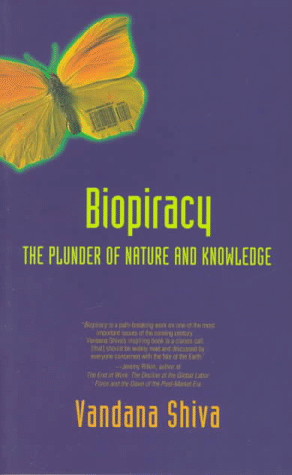November 15, 2002
By Vandana Shiva
 In India we worship cow dung as Lakshmi, the goddess of wealth. Gobur-dhan puja is literally the worship of gobur (cowdung) dhan (wealth).
In India we worship cow dung as Lakshmi, the goddess of wealth. Gobur-dhan puja is literally the worship of gobur (cowdung) dhan (wealth).
Cow dung is worshipped because it is the source of renewal of soil fertility and hence the sustainability of human society. The cow has been made sacred in India because it is a keystone species for agro-ecosystems — it is key to the sustainability of agriculture.
When Monsanto and biotech industry spokesmen parading as “farmers” presented me with cow dung at the WSSD in Johannesburg, I accepted their “award” as a tribute to organic farming and sustainable agriculture.
The small farmers convergence at the W.S.S.D. with farmers from across Africa rejected GMO’s, and chemicals and committed themselves to organic farming, and defense of farmers rights. They are freely choosing seeds they can save and technologies that are sustainable. Farmers organizations in India and in Africa are saying “no” to GMO’s on the basis of their freedom to choose to be organic which means being free of genetic contamination that results from GM crops. Genetic contamination robs farmers of their freedom to be GM free. Patients and intellectual property rights on seed rob farmers of their freedom to save, exchange, develop seed. Farmers are treated as “thieves” and “criminals” for exercising farmers rights. The worst example is that of Parcy Schmeiser whose canola fields were contaminated by Monsanto’s GM canola and he was sued for “theft” of genes. That is why those of us who farm organically and want to maintain our freedom to farm and uphold farmers rights are resisting the irresponsible corporations which are trying to own life on earth, including seed, contaminate our crops and food and have total control over farming and farmers.
GM seeds and chemicals are a threat to farmers survival, a threat to consumer health and a threat to the environment. Farmers in Punjab and Andhra Pradesh are committing suicides because the costly seeds and chemicals from corporations like Monsanto/Mahyco have pushed them into deep, unpayable debt.
The claims of Monsanto and its apologists like Swaminathan Iyer (who called me a “Green Killer” in the Times of India on 22nd Sept 2002, because I practise and promote organic farming) that GM can feed the world is totally false. Monsanto’s Bt cotton has failed across India in its first year of commercial planting. In Khargone in Madhya Pradesh Bt is a 100% failure and farmers are demanding compensation. In Maharastra, the Bt crop has failed on 30,000 hec and farmers are asking for Rs. 500 crore compensation. In Gujarat, in Bhavnagar, Surendranagar and Rajkot Bt cotton has been destroyed by a heavy infestation of bollworm, the pest for whose control the toxin producing Bt. gene has been engineered into cotton. The genetically engineered Bt cotton is not a miracle, it is a fraud on farmers.
In Rajasthan, the hybrid corn which Monsanto claims will give 20 — 50 quintals per acre is giving 1.5 to 1.7 quintals per acre while demanding intensive water and chemical use, aggravating the draught and famine.
The pseudo scientific claims of irresponsible biotech corporations like Monsanto are killing our farmers, our agriculture, our biodiversity.
Organic agriculture is increasing farm productivity by 2 to 3 times, increasing farmers incomes, and protecting public health and the environment. That is why the Time Magazine identified Navdanya as a pioneer for the new century and stated that “In India atleast, Navdanya sets an eco-friendly standard that agribusiness must show it can out perform. The challenge for genetic engineers is to create seeds adapted to particular locales that enable farmers to reduce, not increase, the use of chemicals” (Time, Aug 26, 2002, “Seeds of self Reliance, p 36)
Monsanto and its lobbyists profit by selling and promoting poisonous, toxic seeds and corporate control. Movements like Navdanya celebrate biodiversity, farmers freedom and cow dung. The corporations and corporate spokespeople are getting desperate because people are seeing through their lies and deceptions. With organic farming growing worldwide, and the failures and non-sustainability of genetic engineering and chemical engineering becoming evident, the chemical corporate lobby is getting desperate. I view their personal assaults on me as a symptom of the desperation caused by the failure of non-sustainable industrial, corporate agriculture in removing hunger or improving farmers livelihoods. Sustainable systems are growing because they offer real solutions to the hunger and poverty crisis. And cow dung, biomass and biodiversity are at the heart of sustainability and the non-violent organic alternative to genetic engineering and chemicals.
Ecologically the cow has been central to Indian civilization. Both materially an conceptually the world of Indian agriculture has built its sustainability on maintaining the integrity of the cow, considering her inviolable and sacred, seeing her as the mother of the prosperity of food systems. The integration of livestock with farming has been the secret of sustainable agriculture. Livestock perform a critical function in the food chain by converting organic matter into a form that can be easily used by plants. According to K.M. Munshi, India’s first agriculture minister after independence, “The mother cow and the Nandi are not worshipped in vain. They are the primeval agents who enrich the soil – nature’s great land transformers – who supply organic matter which, after treatment, becomes nutrient matter of the greatest importance. In India, tradition, religious sentiment and economic needs have tried to maintain a cattle population large enough to maintain the cycle, only if we know it
A century ago, Sir Alfred Howard, the father of modern sustainable farming wrote in his classic, An Agricultural Testament, that, ‘In the agriculture of Asia we find ourselves confronted with a system of peasant farming which, in the essentials, soon became stabilized. What is happening today in the small fields of India and China took place many centuries ago. The agricultural practices of the Orient have passed the supreme test – they are almost as permanent as those of the primeval forest, of the prairie, or of the ocean.
Howard identified the principles of sustainable agriculture as those of renewability as seen in the primeval forest. The agricultural Testament is a record of practices that had maintained the soil fertility of India over centuries. Historical records indicate that the alluvial soils of the Gangetic plains have produced fair crops year after year, without falling in fertility. According to Howard, this has been possible because a perfect balance had been reached between the manurial requirements of crops harvested and natural processes which recuperate fertility. The conservation of soil fertility has been achieved through a combination of mixed and rotational cropping with leguminous crops, a balance between livestock and crops, shallow and light ploughing, and organic manuring.
That is why we organize the Howard Memorial Lectures on 2nd October as a remembrance of India as the source of non-violent, sustainable agriculture. This year’s lecture was given by Fukuoka, the Japanese agriculture thinker and chaired by Dr. Tewolde Egziabher, the Ethiopian Environment Minister who has led the Biosafety negotiations in the United Nations.
Howard saw in India’s peasants a knowledge of farming far more advanced than that of the west. He recognized the secret of India’s sustainable land use as lying in the return of organic matter and humus to the soil. A balance between livestock and crops was always kept in order to maintain the food cycle and return organic matter to the soil. The method of mixed cropping is part of the adaptation of nature’s ways in which cereal crops like millet, wheat, barley and maize are mixed with pulses, providing nutrition to give better results than monocultures; Howard notes that, “Here we have another instance where the peasants of the East have anticipated and acted upon the solution of one of the problems which western science is only now beginning to recognize.”
Biodiversity conservation and organic agriculture is increasing food output by 200-300%. Biodiversity intensification rather than chemical intensification is the way forward for Indian agriculture. Organic farming is necessary to increase food production and strengthen food security, conserve natural resources — soil, water, biodiversity, improve farmers incomes and well being, protect rural livelihoods, prevent indebtedness, and stop debt linked farm suicides. It creates freedom from debt, domination and disease.
Corporations are creating poverty by diverting the hard earned income of peasants and farmers to the seed/pesticide industry. The new seeds besides being costly are also ecologically vulnerable to pests and diseases leading to more crop failures and higher use of chemicals. These are killer technologies which are undesirable and unnecessary.
The corporate hijack of agriculture is based on pseudo science and false claims. The violent technologies of genetic engineering and toxic pesticides, and the dishonest, deceitful promotion of these poverty creating capital intensive and non-sustainable technologies is leading to the death of our farmers and the destruction of our ecological security and food security. These are primitive, crude and obsolete technologies that are efficient in destruction, not production.
The agriculture technologies of the future have to work for people, not corporations, they have to work with nature, not against nature. If farmers and farming have to have a future, it has to be organic. Neither the planet nor the poor can afford the waste, inefficiency, deceit, pollution and violence of chemicals and genetic engineering.















